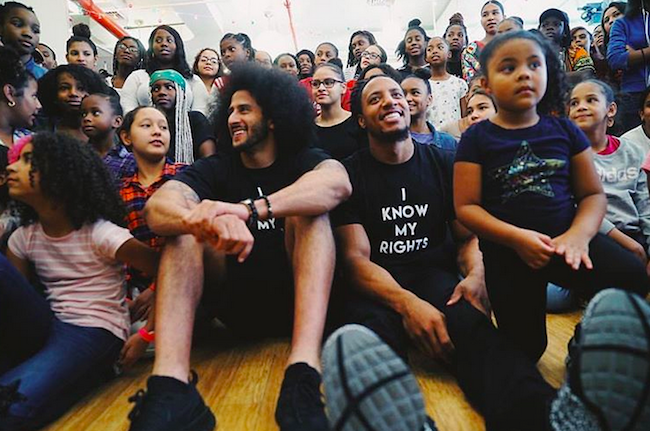
Earlier this month, Nike unveiled an explosive new ad campaign featuring Colin Kaepernick. The pro football star-turned-activist has become a lightening rod for media attention related to the Black Lives Matter movement, and controversy over his position could have sunk the campaign before it even got off the ground.
Instead, Nike is basking in the glow of a $6 billion market cap, an all time high for the company. Perhaps just as importantly, the company cites "record engagement with the brand" in September, indicating that Nike's iconic "Just Do It" slogan is resonating with today's consumers.
Considering that celebrity endorsements can often crash and burn a brand, how is the new Kaepernick campaign different?
Nike and authenticity
In the rather long history of brand-celebrity failures, at least one common denominator emerges. The mismatch only emerges after the contract is signed and the campaign goes public.
That pattern was already evident back in 2007, when Forbes compiled a long list of celebrity endorsements that soured. Sometimes the conflict arises from episodes of bad behavior on the part of the celebrity -- bad meaning anything from being caught snorting cocaine to being accused of murder.
A problem can also occur if aspects of a celebrity's personal beliefs or are found to be inconsistent with the products being pitched, or if the celebrity's professional career takes a turn that reflects poorly on the brand.
This is a two-way street, by the way. Poor quality was alleged to be at the bottom of at least one instance of an athlete endorsement gone wrong.
One apparent exception proves the rule. Back in 1989, Pepsi scored the use of Madonna's hit "Like a Prayer," little knowing that the singer would soon release a not-safe-for-kids video version. Well, they could have -- or should have -- known better. By the late 1980's, Madonna had cemented a fierce grip on pop stardom and had garnered a well earned reputation for pushing every social button within reach.
With all this in mind, Nike's Kaepernick campaign falls in place. The company did have a contract with Kaepernick, before he drew media attention by refusing to stand for the National Anthem during the 2016 football season.
To be clear, the intent was to draw attention to police brutality against people of color, not to protest the U.S. flag, the military, or the national anthem. Nevertheless, President Trump chose to publicly disparage Kaepernick, a decision that helped motivate other players to join in.
The protest spread, and Kaepernick became the face of a national movement that has is closely associated with youth and young adult activism.
Kaepernick gave more weight to his activism by launching "Know Your Rights Camp," an educational and empowerment campaign for young people with a focus on self-protection during police interactions.
Against this backdrop, NFL owners have refused to sign Kaepernick, forcing him to sit out at least two seasons -- and providing him with another opportunity to position himself as a champion for individual rights against a powerful system (Kaepernick has challenged the owners in court, alleging illegal collusion to keep him out of his profession).
Nike had apparently shelved its interest in the Kaepernick contract when the protests first gained steam, but it went into the new Just Do It campaign with a firm sensibility that Kaepernick could and would speak to the deeper social issues facing the U.S. today.
Where earlier campaigns focused on individuals pushing their own boundaries to achieve personal best, the new campaign sends a message that connects self empowerment with social responsibility, recalling the life view attributed to the ancient Jewish sage Hillel:
“If I am not for myself, who will be for me? If I am only for myself, what am I? And if not now, when?”
Now is the time
The new Nike campaign has only been under way for less than a month, so the long term success of the Kaepernick endorsement on a company-wide basis is clearly an open question.
After all, the campaign is just one part of a larger puzzle in the global marketplace. Sales did surge after the campaign launched, though the company's stock took a dip as investors weighed in on unrelated concerns.
Overall, prospects look bright for Nike -- much brighter than they did back at the close of the 20th century, when the company earned a "villain" reputation over conditions in its factories.
The company has been responding to 21st century concerns beyond worker conditions as well, with a focus on renewable energy among other sustainable business practices like recycling and upcycling, and water conservation.
With the new Kaepernick campaign, Nike is leveraging its corporate social responsibility experience into the sphere of social activism.
Look for similar "brands taking stands" campaigns as other major companies step in to fill the leadership vacuum as the U.S. grapples with police brutality, sexual assault, gun violence and other fundamental issues.
Image (screenshot): Know Your Rights Camp via Instagram.

Tina writes frequently for TriplePundit and other websites, with a focus on military, government and corporate sustainability, clean tech research and emerging energy technologies. She is a former Deputy Director of Public Affairs of the New York City Department of Environmental Protection, and author of books and articles on recycling and other conservation themes.














